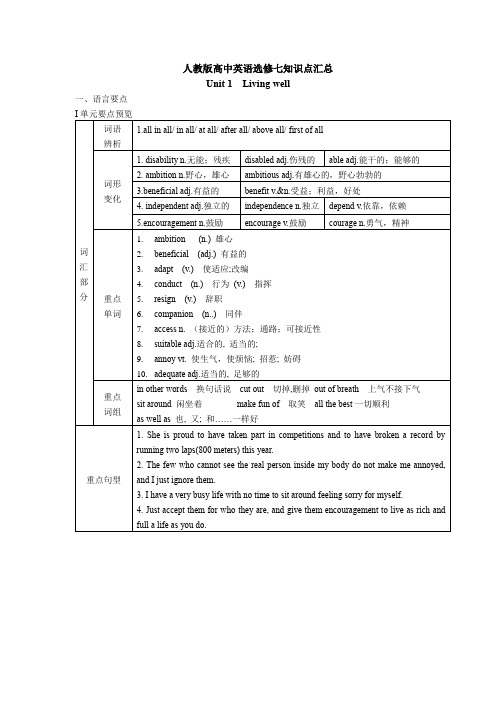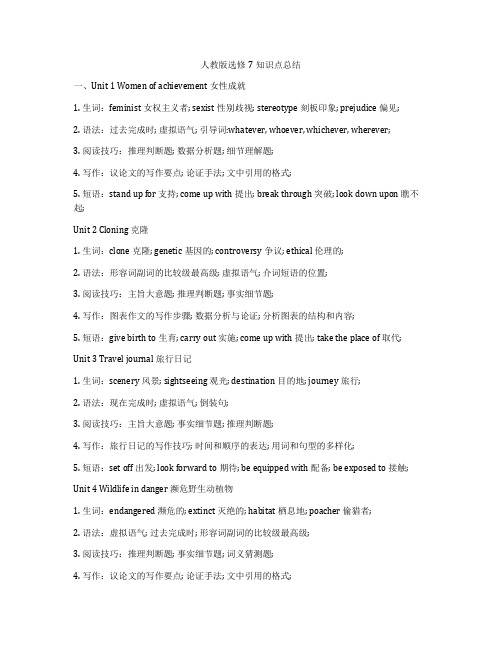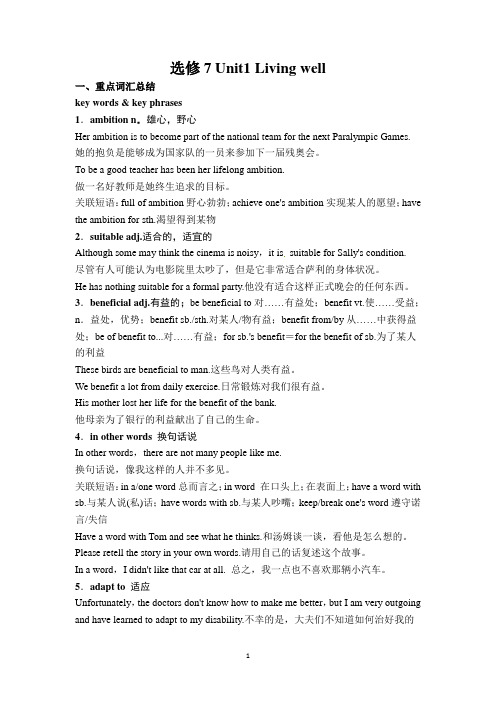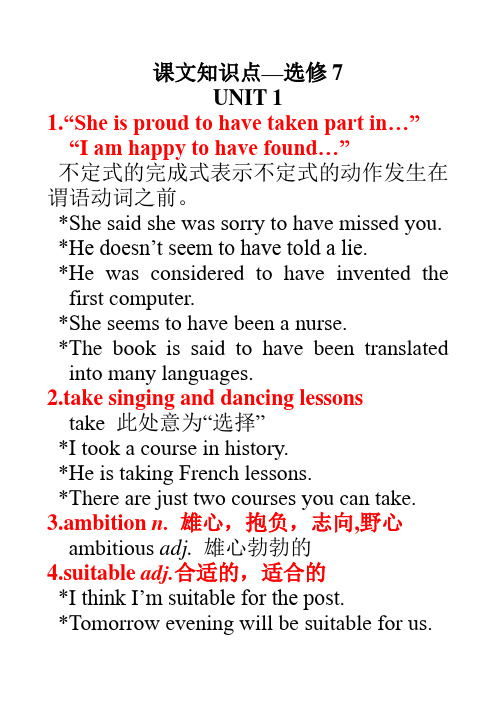高中英语选修七知识点总结归纳
高考英语选修七知识点

高考英语选修七知识点高考英语考试是每位高中生备战大学入学考试的关键一环,其中选修七是被广大学子所熟知的一门课程。
选修七以英语学科的深度和广度为基础,培养学生的快速阅读能力、听力理解能力以及口语表达能力。
本文将介绍高考英语选修七的七个重要知识点。
1. 阅读理解阅读理解是高考英语考试的重点和难点之一。
对于阅读理解题,学生需要通过理解文章的主旨,提取关键信息,准确回答问题。
同时,还要注重培养阅读的速度和准确性。
这可以通过大量的阅读练习来实现,同时还可以多使用词典和语法书来提高自己的词汇量和语法水平。
2. 口语表达口语表达是高考英语考试中的另一个关键点。
为了在口语表达中取得好成绩,学生需要通过大量的听说练习来提高自己的语感和表达能力。
可以参加英语角和英语演讲比赛,与他人进行对话和交流,积极参与各种口语活动。
此外,还可以通过看英文电影和听英文音乐来提高自己的听力能力。
3. 听力理解听力理解是高考英语考试的必考内容之一。
为了在听力理解方面取得好成绩,学生需要通过大量的听力练习来提高自己的听力水平。
可以多听英语广播和英语磁带,尝试着用英语与人进行对话,提高自己的语感和听力能力。
此外,还可以通过做听力练习题,了解不同听力材料的出题规律和解题技巧。
4. 写作技巧写作能力是高考英语考试中的重要一环。
为了提高写作能力,学生需要多读多写,积累词汇和句型。
可以多读英语文学作品,尽量模仿其中的语言风格和表达方式。
另外,还可以通过写作练习题和模拟考试,培养自己的写作技巧和思维方式。
5. 翻译能力翻译能力是高考英语考试中的另一个重点。
为了提高翻译能力,学生需要了解一些常用的翻译技巧和方法。
可以通过多阅读中英文的文学作品和新闻报道,熟悉不同领域的专业术语和常用短语。
此外,还可以参加翻译比赛和翻译培训班,提高自己的翻译水平。
6. 词汇积累词汇积累是高考英语考试中的一个重要方面。
为了扩展词汇量,学生需要有计划地背诵单词和短语。
可以通过背诵单词卡片和词汇书,进行重复和记忆。
英语选修七知识点总结

英语选修七知识点总结1. Reading ComprehensionReading comprehension is a crucial skill in English learning. It helps students understand and digest information from various sources, including textbooks, literature, and articles. To improve reading comprehension, students need to practice regularly and learn to identify main ideas, supporting details, and the author's purpose. Reading different types of texts, such as narrative, expository, and persuasive, can also help students become more versatile readers.2. Literary AnalysisLiterature plays a vital role in English learning. Students need to learn how to analyze literary works, including poems, short stories, and novels. They should pay attention to the setting, characters, plot, and themes to gain a deeper understanding of the text. Moreover, students should be able to recognize and interpret literary devices such as symbolism, imagery, and figurative language. Literary analysis helps students appreciate the beauty of language and understand the cultural context of the text.3. Writing SkillsEffective writing skills are essential for communication and academic success. Students need to learn how to write different types of compositions, including narratives, expository essays, argumentative essays, and research papers. They should focus on organizing their thoughts, using appropriate vocabulary and grammar, and structuring their writing coherently. Additionally, students need to develop editing and revision skills to refine their writing and make it more polished.4. Speaking and ListeningSpeaking and listening skills are equally important in English learning. Students should practice speaking fluently and clearly, expressing their ideas and opinions confidently. They should also be able to listen actively, understand spoken language, and respond appropriately. To improve speaking and listening skills, students can engage in activities such as role-plays, debates, discussions, and presentations. These activities help students become more confident speakers and attentive listeners.5. Vocabulary and GrammarA strong vocabulary and grammar foundation is essential for mastering the English language. Students should learn new words regularly and understand their meanings, usage, and collocations. They should also be familiar with grammar rules and use them accurately in their writing and speaking. To expand their vocabulary and improve their grammar, students can use flashcards, vocabulary lists, and grammar exercises. They can also practice using new words and grammar structures in context to reinforce their learning.6. Critical ThinkingCritical thinking is a key skill in English learning. Students need to analyze and evaluate information, make connections, and draw conclusions. They should learn to think critically about the texts they read, the ideas they encounter, and the arguments they make. Critical thinking enables students to become more independent learners and better decision-makers. Teachers can encourage critical thinking by asking open-ended questions, promoting discussions, and presenting complex issues for students to analyze.7. Cross-Cultural AwarenessEnglish (Integrated Skills) also helps students develop cross-cultural awareness. Through literature and language learning, students can gain insights into different cultures, traditions, and perspectives. They learn to appreciate diversity, empathize with others, and become global citizens. Cross-cultural awareness also helps students communicate effectively with people from different backgrounds and understand the world in a broader context.In conclusion, English (Integrated Skills) for the seventh grade covers various knowledge points that are essential for students' language learning and personal development. By mastering reading comprehension, literary analysis, writing skills, speaking and listening, vocabulary and grammar, critical thinking, and cross-cultural awareness, students can become proficient English users and critical thinkers. With regular practice and guidance from teachers, students can excel in English (Integrated Skills) and use their language skills effectively in their academic and personal lives.。
人教版高中英语选修7知识点汇总_一册全_

人教版高中英语选修七知识点汇总Unit 1 Living well一、语言要点IV 重点词汇1. ambition (n.) 雄心[重点用法]ambitious adj.志向远大的; 有雄心壮志的;有野心的be ambitious for [power, social position, etc.] 极欲获得[权力, 社会地位等]be ambitious of success渴望成功be ambitious to serve the people一心想为人民服务[典例]1) Her ambition is the presidency. 她的抱负是成为一名总统2) After several hours’ work, she had no ambition to go dancing. 没有精力去跳舞了3) The prince was attracted by the girl’s beauty, and ambitious to marry her.王子为女孩的美貌打动了,渴望能娶到她。
2.beneficial (adj.) 有益的[重点用法]benefit v. &n.有助于;受益;利益,好处be beneficial to sth./sb.对……有益be of benefit to对……有益for the benefit of为了……(的利益)benefit from从……中受益[典例]1) A temperate climate is beneficial to the health; 温和气候有利于健康.2) Sunshine is beneficial to plants. 阳光对植物有益。
3) I hope what I have written will be of benefit to someone else who may feel the same way.我希望我写的这些将对有同感的人有帮助.4) Both sides have benefited from the talks.双方都从和谈中受益。
高二英语选修七重要知识点

高二英语选修七重要知识点一、语法知识点1. 从属连词的用法:包括引导名词性从句、形容词性从句和副词性从句的从属连词的用法和句型转换。
2. 虚拟语气:包括虚拟条件句和虚拟语气在宾语从句、表语从句和状语从句中的用法。
3. 情态动词的用法:包括can, could, may, might, must, shall, should, will, would等情态动词的用法和表达方式。
4. 非谓语动词的用法:包括不定式、动名词和分词在句子中的作用和用法。
二、阅读理解技巧1. 主旨大意题:如何通过段落首尾句和关键词来确定文章的主旨大意。
2. 细节理解题:如何通过细节信息找到正确的答案,并注意排除干扰项。
3. 推理判断题:如何通过推理和理解文章的隐含意义来回答问题。
4. 修辞手法题:如何分辨并理解比喻、夸张、反问等修辞手法,并推测作者意图。
三、词汇与固定搭配1. 同义词辨析:掌握一些常用词汇的近义词,如difficult与challenging等。
2. 词性转换:掌握如名词、形容词、动词之间的词性转换,以及词语派生的方法,如derive, derivative等。
3. 习惯用语和短语:掌握常用的习惯用语和短语,如by the way, as a matter of fact等。
四、写作技巧1. 表达观点和观点扩展:如何清晰地表达自己的观点,并用恰当的例子和理由进行拓展。
2. 句子的连贯性和丰富性:如何使用连接词和过渡词使句子之间有逻辑联系,并使用多样的句型和句子结构使文章更有变化。
3. 写作技巧:掌握如段落的开头和结尾、交代背景、写作材料的选择和组织等写作技巧。
五、听力技巧1. 听取关键信息:如何通过听取关键信息来回答问题。
2. 推测上下文:如何通过上下文信息理解未听到的内容。
3. 笔记技巧:如何使用简洁的符号和关键词来记录听力内容。
六、口语表达1. 日常交际口语:如问候、介绍、邀请、表达喜好等常用口语表达。
高中英语选修七课文知识点总结

高中英语选修七课文知识点总结高中英语选修七是一门必修课程,作为英语学习的重要组成部分,它的内容涵盖了从文学到文化、从社会到人生的多个方面。
在学习本课程的过程中,我们经常会遇到很多困难和问题,因此需要及时总结、记录和归纳课文中的关键知识点,以便更好地掌握和应用知识。
下面是对《高中英语选修七》课本中的几篇文章的知识点进行梳理和总结,以供参考。
第一篇文章:《单行道》1.主要人物:主人公-斯诺,斯诺的父亲,斯诺的朋友,斯诺的前妻,斯诺和前妻的女儿。
2.主要情节:本文主要讲述斯诺的成长历程,包括他在家庭、学校和社会中所遇到的困难和挑战。
3.主要主题:本文主要以“单行道”为主题,表达了人生观和价值观,阐述了人要有远大的目标和坚定的信念,面对挫折和困难也要坚持不懈地前行。
第二篇文章:《那一夜,我与喜玛拉雅山雪人做了半夜的梦》1.主要人物:作者,作者的父母,作者的朋友。
2.主要情节:本文主要讲述作者与朋友游历喜马拉雅山,因为想要寻找雪人而在山上过夜的故事。
3.主要主题:本文主要以“雪人传说”为主题,对人们心中的幻想和追求进行了阐述,表达了人们对未知事物的好奇和对自身存在的探索。
第三篇文章:《宠儿》1.主要人物:主人公-李连英,李连英的父母,乡亲们。
2.主要情节:本文主要讲述了李连英的成长历程,包括他的童年生活和在农村的求学经历,以及在自己能力和意志力的帮助下,实现了自身价值的故事。
3.主要主题:本文主要以“成长与奋斗”为主题,强调了通过自身的不断努力和坚持不懈的奋斗,人们可以克服任何困难和挑战,实现自我价值和成长。
第四篇文章:《嫦娥奔月》1.主要人物:主人公-嫦娥,后羿,玉兔。
2.主要情节:本文主要讲述了嫦娥奔月和后羿射日的故事,以及玉兔作为嫦娥的伴侣同它在月球上生活的故事。
3.主要主题:本文主要以“神话传说”为主题,阐述了古代人们的信仰和精神内涵,强调了人与自然的和谐和相互依存的关系。
总之,《高中英语选修七》的课文具有广泛的知识面和深刻的人生哲理,涵盖了人们的价值观、世界观和人生观等多个方面。
人教版选修7知识点总结

人教版选修7知识点总结一、Unit 1 Women of achievement 女性成就1. 生词:feminist 女权主义者; sexist 性别歧视; stereotype 刻板印象; prejudice 偏见;2. 语法:过去完成时; 虚拟语气; 引导词:whatever, whoever, whichever, wherever;3. 阅读技巧:推理判断题; 数据分析题; 细节理解题;4. 写作:议论文的写作要点; 论证手法; 文中引用的格式;5. 短语:stand up for 支持; come up with 提出; break through 突破; look down upon 瞧不起;Unit 2 Cloning 克隆1. 生词:clone 克隆; genetic 基因的; controversy 争议; ethical 伦理的;2. 语法:形容词副词的比较级最高级; 虚拟语气; 介词短语的位置;3. 阅读技巧:主旨大意题; 推理判断题; 事实细节题;4. 写作:图表作文的写作步骤; 数据分析与论证; 分析图表的结构和内容;5. 短语:give birth to 生育; carry out 实施; come up with 提出; take the place of 取代;Unit 3 Travel journal 旅行日记1. 生词:scenery 风景; sightseeing 观光; destination 目的地; journey 旅行;2. 语法:现在完成时; 虚拟语气; 倒装句;3. 阅读技巧:主旨大意题; 事实细节题; 推理判断题;4. 写作:旅行日记的写作技巧; 时间和顺序的表达; 用词和句型的多样化;5. 短语:set off 出发; look forward to 期待; be equipped with 配备; be exposed to 接触;Unit 4 Wildlife in danger 濒危野生动植物1. 生词:endangered 濒危的; extinct 灭绝的; habitat 栖息地; poacher 偷猎者;2. 语法:虚拟语气; 过去完成时; 形容词副词的比较级最高级;3. 阅读技巧:推理判断题; 事实细节题; 词义猜测题;4. 写作:议论文的写作要点; 论证手法; 文中引用的格式;5. 短语:die out 灭绝; be on the verge of 濒临; in the wild 在野外; in search of 寻找;Unit 5 The power of nature 自然的力量1. 生词:earthquake 地震; volcano 火山; tsunami 海啸; hurricane 飓风;2. 语法:情态动词; 定语从句; 引导词(whatever, whichever, whoever, however);3. 阅读技巧:主旨大意题; 词义猜测题; 数据分析题;4. 写作:说明文的写作步骤; 结构分段; 衔接手法;5. 短语:be buried alive 被活埋; come in waves 成波浪般的涌来; on a massive scale 大规模地; take the lives of 夺去……的生命;Unit 6 The environment 环境1. 生词:pollution 污染; emission 排放; conservation 保护; recycling 回收;2. 语法:虚拟语气; 定语从句; 过去完成时;3. 阅读技巧:推理判断题; 词义猜测题; 主旨大意题;4. 写作:环保主题的议论文写作要点; 论证手法; 文中引用的格式;5. 短语:make contributions to 对……有所贡献; take action 采取行动; give off 发出; do harm to 对……有害;Unit 7 Teenagers should be allowed to choose their own clothes 小标题1. 生词:fashion 时尚; peer pressure 同辈压力; restriction 限制; individuality 个性;2. 语法:虚拟语气; 定语从句; 介词短语的位置;3. 阅读技巧:推理判断题; 词义猜测题; 事实细节题;4. 写作:议论文的写作步骤; 结构分段; 衔接手法;5. 短语:fit in with 与……相符; go with 与……搭配; be exposed to 接触; be obsessed with 着迷于;以上是人教版选修7的知识点总结,包括生词、语法、阅读技巧、写作和短语等方面的内容。
人教版高中英语选修7 重点汇总(全套,精品)

选修7 Unit1 Living well一、重点词汇总结key words & key phrases1.ambition n.雄心,野心Her ambition is to become part of the national team for the next Paralympic Games.她的抱负是能够成为国家队的一员来参加下一届残奥会。
To be a good teacher has been her lifelong ambition.做一名好教师是她终生追求的目标。
关联短语:full of ambition野心勃勃;achieve one's ambition实现某人的愿望;have the ambition for sth.渴望得到某物2.suitable adj.适合的,适宜的Although some may think the cinema is noisy,it is suitable for Sally's condition.尽管有人可能认为电影院里太吵了,但是它非常适合萨利的身体状况。
He has nothing suitable for a formal party.他没有适合这样正式晚会的任何东西。
3.beneficial adj.有益的;be beneficial to对……有益处;benefit vt.使……受益;n.益处,优势;benefit sb./sth.对某人/物有益;benefit from/by从……中获得益处;be of benefit to...对……有益;for sb.'s benefit=for the benefit of sb.为了某人的利益These birds are beneficial to man.这些鸟对人类有益。
We benefit a lot from daily exercise.日常锻炼对我们很有益。
课文知识点 选修7

课文知识点—选修7UNIT 11.“She is proud to have taken part in…”“I am happy to have found…”不定式的完成式表示不定式的动作发生在谓语动词之前。
*She said she was sorry to have missed you. *He doesn’t seem to have told a lie.*He was considered to have invented the first computer.*She seems to have been a nurse.*The book is said to have been translated into many languages.2.take singing and dancing lessonstake 此处意为“选择”*I took a course in history.*He is taking French lessons.*There are just two courses you can take. 3.ambition n.雄心,抱负,志向,野心ambitious adj.雄心勃勃的4.suitable adj.合适的,适合的*I think I’m suitable for the post.*Tomorrow evening will be suitable for us.*Have you got a suitable book for children?5.beneficial adj.有益的,有好处的benefit vt.对…有利,有利于vi.受益于(from/by)n.好处,益处(不可数)*Your advice is beneficial to me=Your advice benefits me.=I benefit from/by your advice.*Rain will benefit the crops.=Rain will be beneficial to the crops.=The crops will benefit from the rain.所以 A benefit B = B benefit from/by A 6.one in a million 一百万里一个也可说one out of a million7.in other words 换句话说=that’s to say*I soon found that the work I was doing had already been done by someone else. In other words, I was wasting my time.in a word 总之,一句话*In a word, I don’t trust him.*John is smart, polite, and well-behaved. In a word, he is admirable.in words用语言*She never expresses herself in words.8.adapt vt.使适应,改编adapt to适应*You must adapt (yourself) to the new environment.*He hasn’t adapted (himself) to the hot climate here.*The play has been adapted from his book. *The author is going to adapt his book for TV.adopt vt.采纳,采用;收养*They had adopted my plan.*She adopted a homeless child, who became her adopted son.9.absence n.缺席,不在;没有,不存在absent adj.缺席的;心不在焉的;不存在,没有*He is absent from school today.*Three boys were absent.*He looked at me in an absent way when I talked to him.*Snow is absent in some countries.*I didn’t notice his absence.*He acted as chairman in my absence.*Darkness is absence of light.absent 的反义词是present;absence的反义词是presence.10.annoy vt.使恼怒,使懊恼;烦扰*A mosquito keeps annoying me.*His words annoyed me.*His words were annoying.(恼人的)*I was annoyed by his words.(感到恼怒的) 11.all in all 总的来说*All in all, he’s more learned than he was ten years ago.*He has his faults, but, all in all, he is a good helper.*All in all, it was a great success.12.“As well as going to the movies…, I spend a lot of time…”as well as在句首常译作“除…之外,也”. *He can speak English as well as French.=As well as French, he can speak English. *She takes private pupils as well as teaching in school.=As well as teaching in school, she takes private pupils*As well as flowers, he plants vegetables.*As well as the first month’s rent, you must deposit $200.13.be worth it值得(这么做)*They are expensive, but they are worth it. *It was a hard climb, but the view from the top is worth it.*I shall feel sorry for him, though he’s not worth it.14.“to live as rich and full a life as you do”注意下列副词后不定冠词的位置:as/how/so/too+adj.+a/an+n.*How clever a boy he is!*It is so difficult a task that I can’t finish it on my own.*It is too difficult a task to do alone.15.conductA.n.行为,品行,表现*She always got the good conduct prize.*Your conduct is disappointing.B.vt.指挥,管理,主持,导(电)conduct a meeting主持会议conduct an experiment 做实验conduct a survey做调查conduct the orchestra/opera指挥乐队/歌剧*Copper conducts electricity.conductor n.指挥,乘务员/售票员,导体16.There was a time when…此处when引导定语从句,修饰time。
- 1、下载文档前请自行甄别文档内容的完整性,平台不提供额外的编辑、内容补充、找答案等附加服务。
- 2、"仅部分预览"的文档,不可在线预览部分如存在完整性等问题,可反馈申请退款(可完整预览的文档不适用该条件!)。
- 3、如文档侵犯您的权益,请联系客服反馈,我们会尽快为您处理(人工客服工作时间:9:00-18:30)。
高中英语选修七知识点总结归纳高中英语选修七知识点1Unit1:1. disability n.无能;残疾disabled adj.伤残的able adj.能干的;能够的2. ambition n.野心,雄心ambitious adj.有雄心的,野心勃勃的3.beneficial adj.有益的benefit v.&n.受益;利益,好处4. independent adj.独立的independence n.独立depend v.依靠,依赖5.encouragement n.鼓励encourage v.鼓励courage n.勇气,精神单词:1.ambition (n.) 雄心2.beneficial (adj.) 有益的3.adapt (v.) 使适应;改编4.conduct (n.) 行为 (v.) 指挥5.resign (v.) 辞职6panion (n..) 同伴7.access n. (接近的)方法;通路;可接近性8.suitable adj.适合的, 适当的;9.annoy vt. 使生气,使烦恼; 招惹; 妨碍10.adequate adj.适当的, 足够的重点词组in other words 换句话说 cut out 切掉,删掉 out of breath 上气不接下气sit around 闲坐着 make fun of 取笑 all the best一切顺利as well as 也, 又; 和……一样好重点词汇1. ambition (n.) 雄心ambitious adj. 志向远大的; 有雄心壮志的;有野心的2. beneficial (adj.) 有益的benefit v. &n.有助于;受益;利益,好处be beneficial to sth./sb.对……有益be of benefit to对……有益for the benefit of为了……(的利益)benefit from从……中受益3. adapt (v.) 使适应;改编adapt (oneself) to sth.适应某物adapt…to…使……适应……adapt sth. for sth. from sth.根据某事将……改编成……be adapted from… 由……改编4. conduct (n.) 行为 (v.) 指挥conductor n. 领导者, 经理,a bad conduct恶劣行为under the conduct of在...指导[管理]下5. resign (v.) 辞职;委托, 把...交托给(to, into) resign one's position (as secretary) 辞去(秘书)职务resign office辞职resign oneself to听任(某种影响); 只好(做某事)resign oneself to one's fate听天由命resign ... to... 把... 托付给6. panion (n..) 同伴make panions of 与...作伴,与...为友panions in arms战友a faithful panion忠实伴侣7. access n. (接近的)方法;通路;可接近性accessible adj. 易接近的, 可到达的,accessible to(prep.)8. suitable adj.适合的, 适当的;suit v. 合适, 适合, 相配,unsuitable adj. 不适合的, 不相称的be suitable for (doing) sth./sb. 很适合(做)……9. annoy vt. 使生气,使烦恼; 招惹; 妨碍be annoyed at/by sth.因为某事而感到困扰get /be annoyed with sb.生某人的气annoying 令人恼火的annoyed 恼怒的;烦恼的10. adequate adj.适当的, 足够的; 差强人意的高中英语选修七知识点2Unit2:不定式1.不定式的被动形式当不定式与逻辑主语之间是被动关系时即不定式的逻辑主语是不定式所表示动作的承受者不定式一般要用被动形式。
其被动式可以分为两种一般式和完成式。
(1) 一般式to be done表示不定式动作在谓语动词之后或者同时发生。
It is a great honor to be invited to speak here. 很荣幸被邀请在这里讲话。
The novel is said to be published next month. 据说这本小说下月要出版。
(2) 完成式 to have been done 表示不定式动作发生在谓语动词之前。
The book is said to have been translated into six languages.这本书据说已经被翻译成六种语言。
The boss preferred to have been given more work to do.老板宁愿被分给更多的工作做。
被动一般式 to be done 完成式 to have been done2.不定式被动形式的作用(1)作主语It's an honor to be invited to the ceremony.很荣幸被邀请赴宴。
It's a pity to be kept in the house in such fine weather.在这样好的天气被关在家里真是遗憾。
(2)作表语The letter is to be sent by airmail. 这封信笺要空邮。
(3) 作宾语She didn't like to be treated as a child.她不喜欢被当成孩子。
The boy asked to be given an opportunity to try again.那男孩要求给他再试一次的机会。
(4)作宾语补足语I'd like my bedroom to be cleaned. 我想整理一下我的卧室。
(5)作定语He was the last one to be asked to speak at the meeting.他是最后一个在会上被邀请发言的人。
(6)作状语His mother left the small village never to be seen again.他母亲离开了那个小山村,再也没有人见过她。
3.不定式有些要注意的地方(1) 感官动词和一些使役动词的不定式的主动形式要省去to 但在变成被动语态后需要加上to能这样用的动词或动词词组有make have let see hear notice listen to watch等。
如:We often see him act like that. He is often seen to act like that. 我们常常看到他那样做。
(2)在can't help buthave nothing to do but结构中介词but后的不定式省去to。
如:I can't_help_but suspect his motive. 我不禁怀疑起他的动机。
I have nothing to do but watch TV. 我没什么事情可做除了看电视。
(3)不定式有时要用主动形式表示被动意义①形容词以及含有形容词的名词后的不定式,一般用主动形式表示被动意义其中形容词常见的有easy difficult important impossible等。
如:The work is impossible to finish in two days. 工作不可能两天之内完成。
English is not so easy to learn. 英语并不好学。
① 一些固定用法如“挨骂受责备受批评” 用be to blame “(东西等)出租”用to let。
V-ing 的用法:1.作主语Swimming is good for health.2. 作表语 Teaching is learning.教学相长.注意:1)动名词和不定式都可以作主语,动名词作主语表示一般或抽象的多次性行为,不定式作主语往往表示具体的或一次性的动作。
如:Playing with fire is dangerous. (泛指玩火)To play with fire will be dangerous.(指一具体动作)2). V-ing形式和不定式都要有对称性;当主语是不定式时,表语也用不定式;反之,当主语是 V-ing 形式时,表语也用V-ing 形式。
To see is to believe.= Seeing is believing.3). It’s no use (good) doing sthIt’s a waste of time doing sthit 作形式主语, 只用V-ing,不用不定式。
※ It is + adj. + (for sb ) to do sthIt is no use crying over spilt milk.覆水难收。
It is a waste of time talking (talk) to him .It is important for me to learn (learn) English .3.作宾语 V-ing 形式既可作动词的宾语, 也可作介词的宾语。
We would appreciate hearing from you.我们会珍惜你的来信。
高中英语选修七知识点3Unit4:定语从句1. 关系代词 that, which (物) that, who,whom(人)whose(人和物)①关系代词在从句做主语,宾语,表语。
当做宾语时,可以省略。
A plane is a machine that can fly.(that做主语,先行词是物)The book (which) I gave you was worth $10.(which先行词是物,在从句中作宾语可省,) She is the pop star (that) I want to see very much.(that先行词是人,在从句中做宾语可省)②who在从句中多做主语,whom只能做宾语,(介词和动词后)Do you know the man who is talking with yourmother?(who在从句中做主语,先行词是人)The boy (whom) she loved died in the war.(whom在从句中做宾语,可省)③ whose先行词即可是人也可是物。
